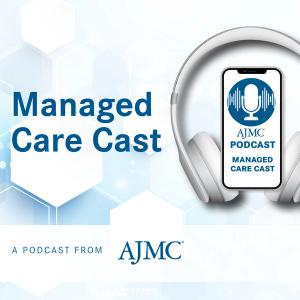
Experts discuss the clinical and economic burden of idiopathic pulmonary fibrosis (IPF), emerging clinical data, and strategies to improve patient outcomes.

Experts discuss the clinical and economic burden of idiopathic pulmonary fibrosis (IPF), emerging clinical data, and strategies to improve patient outcomes.

Janet Pope, MD, MPH, discusses screening and diagnostic approaches for interstitial lung disease in patients with systemic sclerosis, rheumatoid arthritis, and other connective tissue diseases.

Panelists discuss that improving outcomes for patients with idiopathic pulmonary fibrosis (IPF) and progressive pulmonary fibrosis (PPF) requires multifaceted efforts including developing patient-centered clinical measures, managing comorbidities, leveraging digital health tools for real-time monitoring, and addressing health equity to ensure timely, personalized care that truly reflects patients’ lived experiences.

Panelists discuss the shift toward patient-centered outcomes in idiopathic pulmonary fibrosis and progressive pulmonary fibrosis treatment, emphasizing quality of life and symptom relief alongside lung function, while expressing optimism that emerging therapies may eventually reverse or prevent fibrosis, fundamentally transforming disease management.

Panelists discuss how emerging, better-tolerated oral therapies for idiopathic pulmonary fibrosis (IPF) and progressive pulmonary fibrosis (PPF) could improve patient adherence and simplify treatment regimens, potentially enabling combination approaches that target multiple disease pathways while reducing polypharmacy and health care costs.

Panelists discuss recent trial data demonstrating that a novel agent not only slows lung function decline but also delays oxygen dependency and improves survival in both idiopathic pulmonary fibrosis (IPF) and a broad progressive pulmonary fibrosis (PPF) population, with consistent safety and tolerability supporting its expanding role in fibrotic lung disease management.

Panelists discuss recent phase 3 trial results of a novel oral agent for idiopathic pulmonary fibrosis (IPF) and progressive pulmonary fibrosis (PPF), highlighting its ability to significantly reduce lung function decline and mortality—even when added to existing antifibrotic therapies—while maintaining a favorable safety and tolerability profile.

Panelists discuss exciting phase 3 trial data on a novel selective phosphodiesterase inhibitor that elevates intracellular cyclic AMP (cAMP) to activate anti-inflammatory and antifibrotic pathways, showing promise in slowing disease progression in idiopathic pulmonary fibrosis (IPF) and progressive pulmonary fibrosis (PPF).

Panelists discuss several promising new agents for idiopathic pulmonary fibrosis (IPF) and progressive pulmonary fibrosis (PPF), including an LPA1 receptor antagonist showing lung function preservation, integrin inhibitors targeting fibrotic pathways despite safety challenges, and inhaled prostaglandins being evaluated as a well-tolerated add-on therapy in ongoing trials.

Panelists discuss how antifibrotic therapies for idiopathic pulmonary fibrosis (IPF) and progressive pulmonary fibrosis (PPF) slow disease progression despite challenges with cost, tolerability, and limited symptom relief, emphasizing the importance of patient education and aligning treatment goals.

Panelists discuss how effective management of idiopathic pulmonary fibrosis (IPF) and progressive pulmonary fibrosis (PPF) relies on early, accurate diagnosis and multidisciplinary collaboration, with a focus on personalized treatment strategies, proactive adverse effect management, and supportive interventions like pulmonary rehabilitation and nutrition to enhance quality of life and improve long-term outcomes.

Panelists discuss how managing idiopathic pulmonary fibrosis (IPF) and progressive pulmonary fibrosis (PPF) requires a comprehensive, patient-centered approach that addresses not only physiological decline but also the significant psychological, social, and functional burdens patients face—highlighting the need for early diagnosis, emotional support, and coordinated care to improve both quality of life and health care outcomes.

Panelists discuss how progressive pulmonary fibrosis (PPF) and idiopathic pulmonary fibrosis (IPF), though distinct in etiology, share a common trajectory of irreversible lung scarring and functional decline—highlighting the importance of recognizing progressive phenotypes across interstitial lung diseases to guide timely diagnosis, personalized treatment, and improved patient outcomes.

Panelists discuss how progressive pulmonary fibrosis (PPF) and idiopathic pulmonary fibrosis (IPF), though distinct in etiology, share a common trajectory of irreversible lung scarring and functional decline—highlighting the importance of recognizing progressive phenotypes across interstitial lung diseases to guide timely diagnosis, personalized treatment, and improved patient outcomes.

Panelists discuss how progressive pulmonary fibrosis (PPF) and idiopathic pulmonary fibrosis (IPF), though distinct in etiology, share a common trajectory of irreversible lung scarring and functional decline—highlighting the importance of recognizing progressive phenotypes across interstitial lung diseases to guide timely diagnosis, personalized treatment, and improved patient outcomes.

Panelists discuss how idiopathic pulmonary fibrosis (IPF), a progressive and often fatal interstitial lung disease, presents significant clinical challenges due to its variable trajectory, limited treatment options, and poor prognosis—underscoring the importance of early diagnosis and specialized care and the need for therapies that can more effectively alter disease progression.

Published: May 28th 2025 | Updated:

Published: May 28th 2025 | Updated:

Published: November 25th 2025 | Updated:

259 Prospect Plains Rd, Bldg H
Cranbury, NJ 08512
© 2025 MJH Life Sciences®
All rights reserved.
